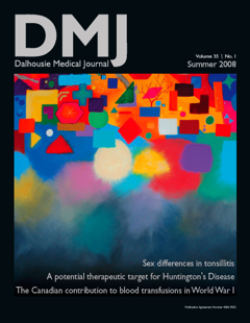Inhibition of caspase-6: A potential therapy for Huntington‘s disease
DOI:
https://doi.org/10.15273/dmj.Vol35No1.3920Abstract
Huntington‘s disease (HD) is an inherited, neurodegenerative disorder that affects one in every ten thousand North Americans and for which there is currently no cure. HD is caused by an increase in the length of a CAG tri-nucleotide repeat array within the HD gene, leading to expansion of a polyglutamine tract within the huntingtin protein (htt). The mutant huntingtinprotein (mhtt) is known to cause selective degeneration of neurons in the striatum resulting in movement and cognitive dysfunction. The molecular basis of mhtt-dependent HD pathology is unclear, but a recent study has shown that inhibiting cleavage of mhtt by the protease caspase-6 is sufficient to halt death of striatal neurons and behavioral dysfunction in a rodent model of HD. In this report, current hypotheses concerning the molecular basis of HD, and existing and experimental therapies for treating HD will be reviewed with particular emphasis on the potential development of anti-caspase-6 drugs that may provide the most promising breakthrough yet for treating this devastating disorder.
Downloads
Published
2008-09-12
How to Cite
Quinn, M. (2008). Inhibition of caspase-6: A potential therapy for Huntington‘s disease. DALHOUSIE MEDICAL JOURNAL, 35(1). https://doi.org/10.15273/dmj.Vol35No1.3920
Issue
Section
Research
License
Authors who publish with this journal agree to the following terms:
- Authors retain copyright and grant the journal right of first publication with the work simultaneously licensed under a Creative Commons Attribution License that allows others to share the work with an acknowledgement of the work's authorship and initial publication in this journal.
- Authors are able to enter into separate, additional contractual arrangements for the non-exclusive distribution of the journal's published version of the work (e.g., post it to an institutional repository or publish it in a book), with an acknowledgement of its initial publication in this journal.
- Authors are permitted and encouraged to post their work online (e.g., in institutional repositories or on their website) prior to and during the submission process, as it can lead to productive exchanges, as well as earlier and greater citation of published work (See The Effect of Open Access).


